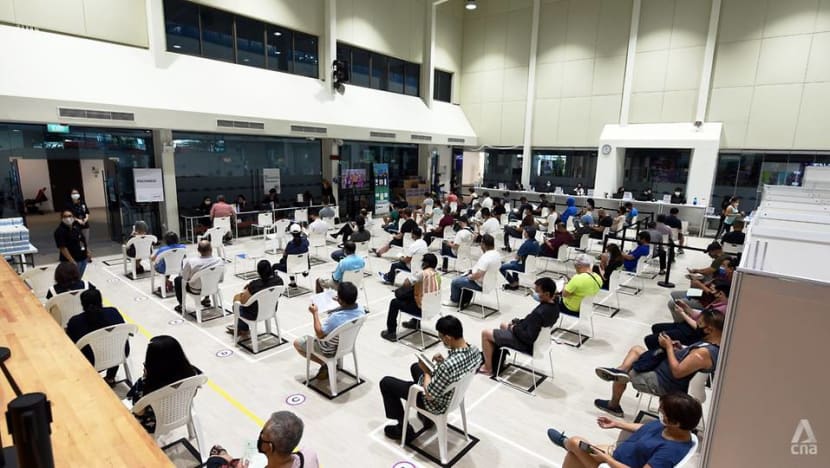More COVID-19 cases who are vaccinated may not need to be hospitalised as Singapore adjusts healthcare protocols

Members of the public waiting in an observation area after receiving the COVID-19 vaccination. (Photo: Marcus Mark Ramos)
SINGAPORE: As COVID-19 becomes endemic, Singapore must shift its healthcare protocols to treat the disease closer to how it approaches influenza, said Health Minister Ong Ye Kung on Monday (Jul 26).
This includes allowing more COVID-19 cases who are vaccinated and who show mild or no symptoms to be directly admitted to community care facilities instead of going first to hospitals.
Delivering a ministerial statement in Parliament, Mr Ong said: "As we learn to live with COVID-19, our healthcare protocols must be remodelled. If COVID-19 is indeed endemic, having 200 or more cases a day may not be unusual at all.
"During an Influenza season, our daily infection can go up to 1,000 a day."
Mr Ong added that if Singapore treats influenza the way it treats COVID-19 now - with polymerase chain reaction tests, long stays in hospital and quarantine - the healthcare system will not be able to cope.
Watch: COVID-19 task force chairs deliver ministerial statements on Government's response to pandemic
READ: Return to Phase 2 (Heightened Alert) does not change roadmap of treating COVID-19 as endemic: Ong Ye Kung
"It will disrupt the lives of many people. Further hospital beds will all be filled, and many other patients who are sicker will be turned away. The healthcare system will not be able to cope, and that is clearly not the way to deal with an endemic disease," he said.
“We cannot carry on with the current healthcare protocols for COVID-19. They need to shift closer to how we treat influenza today, without extensive contact tracing and quarantine in dedicated facilities, and hospitalising only those who are very ill."
However, this can only happen if the likelihood of developing a very serious or life-threatening disease has been “significantly reduced” by COVID-19 vaccinations, said Mr Ong, especially among the vulnerable groups.
READ: 'Practically all' social, workplace COVID-19 restrictions could be lifted in 'truly endemic state': Gan Kim Yong
READ: COVID-19 restrictions to be reviewed in early August, any easing only for vaccinated people: Lawrence Wong
COMMUNITY CARE FACILITIES
Singapore already started to make some changes to its healthcare protocols last week, said the Health Minister.
Vaccinated people aged between 45 and 59 who test positive for COVID-19 and who show mild or no symptoms can be directly admitted to community care facilities instead of going first to hospitals.
This was already the practice for all cases aged between 17 and 45, but authorities are expanding the protocol to include older people.
READ: COVID-19: What happens when a pandemic becomes endemic?
“With this change, we expect up to 60 per cent of infected cases to recover in community care facilities, instead of in acute care,” Mr Ong said.
"We will plan for the next step, where perhaps 80 per cent can be admitted to community care facilities, and some can even start to recover at home."
SHORTER STAY IN HOSPITALS
The length of stay in hospitals and community care facilities has also been shortened from 21 days in general for most people to 14 days for fully vaccinated individuals, Mr Ong said.
They are then given a seven-day leave of absence, as long as their tests show that they are negative for COVID-19 or have very low viral loads.
“Our tests have shown that the viral load in infected persons who are fully vaccinated falls very rapidly, to a very low level after nine days,” he explained.
Mr Ong added that the authorities are “further reviewing” the policy to allow fully vaccinated patients to be discharged even earlier, and to complete the rest of the isolation period at home if their home environment is suitable.
READ: Commentary: TraceTogether and SafeEntry were never foolproof in averting recent fishery port and KTV clusters
Another shift in protocols is to allow more to quarantine at home, Mr Ong said.
“For fully vaccinated persons under quarantine, they can now serve their quarantine at home instead of at a government quarantine facility, provided that their home is suitable for isolation,” he said.
He added that the Government expects up to 40 per cent of people under quarantine to be able to serve it at home, with the figure increasing to more than 50 per cent in the coming few weeks as more people are vaccinated.
SAFETY OF VACCINES
Responding to Members of Parliament Darryl David (PAP-Ang Mo Kio), Lim Wee Kiak PAP-Sembawang) and Murali Pillai (PAP-Bukit Batok) who asked about the safety of COVID-19 vaccines, Mr Ong said that his ministry has been publishing monthly safety updates on its website.
As of Jun 30, the Health Sciences Authority (HSA) has received 12 reports of myocarditis and pericarditis in people who received a dose of the mRNA-based COVID-19 vaccine.
“While there is a small increased risk among those in the younger age groups relative to the baseline rate, the local incidence rate remains low,” he said.
Mr Ong noted that one of the reported cases is a full-time national serviceman in the Singapore Armed Forces who is below 30 years old. There were no cases from the Singapore Police Force and Singapore Civil Defence Force, he said.
READ: Concessions will be extended to people vaccinated with Sinovac when evidence justifies it, says Ong Ye Kung
Currently, only the Pfizer-BioNTech/Comirnaty and Moderna mRNA vaccines are approved under the Pandemic Special Access Route for use in Singapore's national vaccination programme.
Those who have received the Sinovac vaccine do not count towards the national vaccination targets.
Responding to questions about the Sinovac vaccine, Mr Ong said that about 72,000 people have received at least one dose of the Sinovac vaccine. About 17,000 people received their second doses.
Concessions on safe management measures will be extended to people vaccinated with Sinovac's COVID-19 vaccine when there is enough evidence to justify it, he added.
BOOKMARK THIS: Our comprehensive coverage of the COVID-19 pandemic and its developments
Download our app or subscribe to our Telegram channel for the latest updates on the coronavirus outbreak: https://cna.asia/telegram












